I am very new to C but I am having trouble on what seems a very trivial problem. All I am trying to do is create a n sized array, such that at the time of running I don't know its size and can't specify it. The following code works perfectly well.
int main()
{
int LuhnsArray[15] = {0};
for(int i = 0; i < 15; i++)
{
printf("%i ", LuhnsArray[i]);
printf("\n");
}
}
However when I try and so something like this:
int main()
{
int length = 15;
int LuhnsArray[length] = {0};
for(int i = 0; i < length; i++)
{
printf("%i ", LuhnsArray[i]);
printf("\n");
}
}
Something which I would deem logical (something which I think would work in python for example) it comes up with an error attached. Could someone please point me in the right direction. Any chance of help from a newbie?
